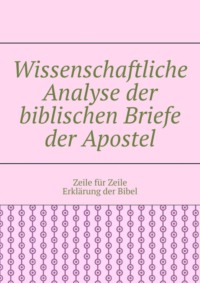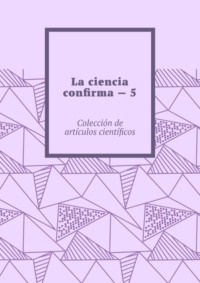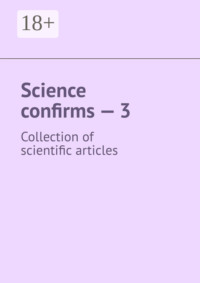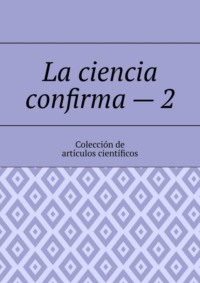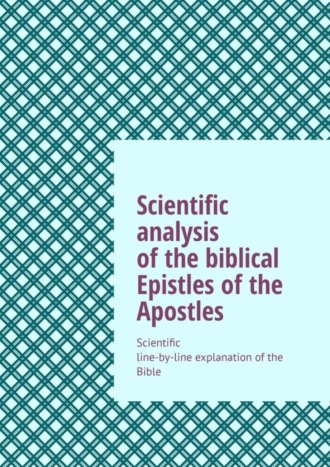
Полная версия
Scientific analysis of the biblical Epistles of the Apostles. Scientific line-by-line explanation of the Bible
13 I write to you, fathers, because you have known who is from the beginning. I am writing to you, young men, because you have defeated the evil one. I am writing to you, boys, because you have known the Father. (The author declares that he is writing a new commandment for the older generation, young men and boys. The mention of «Being», «evil», «Father»).
14 I have written to you, fathers, because you have known the Beginningless. I have written to you, young men, because you are strong, and the word of God abides in you, and you have overcome the evil one. (The mention of «Beginningless», «evil», «the word of God» – the installation of the hypnotist).
15 Do not love the world, nor what is in the world: who loves the world, there is no love of the Father in him. (The statement that there is no need to love the world).
16 For all that is in the world, the lust of the flesh, the lust of the eyes, and the pride of life, is not of the Father, but of this world. («All that is in the world» – «is not of the Father, but of this world», the statement that the world is not of God the father. The question arises, and from whom, if the world was created by the same God-father!?! Condemnation of lust, pride).
17 And the world passes away, and his lust, but he who does the will of God abides forever. («The world passes away, and his lust», «he who fulfills the will of God abides forever», that is, a submissive and obedient slave who performs everything without a murmur and is the ideal of nascent Christianity!).
18 Children! lately. And as you have heard that the Antichrist is coming, and now many antichrists have appeared, then we will learn from the fact that the last time. (Antichrist (Greek) – letters, «opponent of Christ» or «instead of Christ». The opponent of Christ and Christians, who must come before the end of the world, is «the man of sin, the son of perdition» (2 Thess 2:3). In a broad sense, the antichrist is rejecting Jesus Christ and his teaching).
19 They went out from us, but they were not ours; for if they had been ours, they would have remained with us; but [they went out, and] through this it was revealed that not all of us are ours. (It turned out that «not all of our», that is, former comrades-in-arms are pursuing a different policy. But how did God the father not know about it!?).
20 Nevertheless, you have the anointing of the Holy One, and you know all things. (Mention of «anointing from the Saint.» The Messiah (Greek transcription of the Hebrew «Mashiach») – letters. it means «anointed, anointed.» The meaning of this word comes from the ancient customs of anointing with «sacred» oil, symbolizing the transfer of some special spiritual gift. Anointed persons were called persons with the highest spiritual and secular power: kings, priests, prophets. After the fall of the Kingdom of Judah, the word «anointed» came to mean the King of the Last Times. The Greek word «Christ» means the same as the Hebrew word «Messiah» – anointed one).
21 I have written to you not because you do not know the truth, but because you know it, [as well as] that every lie is not from the truth. (Truth is not a lie!).
22 Who is a liar if not the one who denies that Jesus is the Christ? This is the Antichrist who rejects the Father and the Son. (Former associates reject that Jesus is the Christ, that is, the «anointed one.» Anointing is (most often with olive oil) a way of caring for the body and hair in ancient times. The elevation to the royal dignity, the transfer of the prophetic gift were also accomplished through a special anointing with the sacred olive oil. Therefore, in the New Testament, the word «anoint» acquires a second meaning – «to transmit a spiritual Gift»).
23 Whosoever rejects the Son has neither the Father; but he who confesses the Son has also the Father. (God the father and God the son in conjunction: the two gods).
24 Therefore, what you have heard from the beginning, let it also abide in you; if what you have heard from the beginning abides in you, then you will also abide in the Son and in the Father. (God the father and God the son in conjunction: the two gods).
25 But the promise that he promised us is eternal life. (A vow is a promise of eternal life, a dream of people).
26 This I have written to you about those who deceive you. (Seducers behave «incorrectly»).
27 Nevertheless, the anointing which you have received from him abides in you, and you have no need for anyone to teach you; but as this very anointing teaches you everything, and it is true and untrue, what it has taught you, abide in it. («Anointing» has a sacred meaning).
28 Therefore, children, abide in him, so that when he appears, we may have boldness and not be ashamed before him at his coming. (It is necessary to «abide in Him,» that is, to be an obedient toy in the hands of manipulative priests, so that «we may have boldness and not be ashamed before Him at His coming.» Endless suggestion about the second coming of Jesus).
29 If you know that he is righteous, know also that everyone who does the truth is born of him. (Truth-tellers are «born of Him,» that is, from Jesus Christ).
Chapter 3
1 See what kind of love the Father has given us, so that we can be called and be children of God. The world does not know us because it has not known Him. (God the father Yahweh gave love «so that we could be called and be children of God», the suggestion of exclusivity and «being chosen», but the world does not know this yet, since Jesus is unknown).
2 Beloved ones! we are now children of God; but it has not yet been revealed what we will be. We only know that when it opens, we will be like Him, because we will see Him as He is. (The «Children of God» will become like Jesus).
3 And everyone who has this hope in him cleanses himself as he is pure. (Praise of Jesus Christ).
4 Whosoever commits sin also commits iniquity; and sin is iniquity. (Condemnation of sinfulness and iniquity).
5 And you know that he appeared to take away our sins, and that there is no sin in him. (Praise of Jesus Christ).
6 Whosoever abides in him does not sin; whosoever sins has not seen him and has not known him. (Praise of Jesus Christ).
7 Kids! let no one deceive you. Whoever does the truth is righteous, just as He is righteous. (Praise of Jesus Christ).
8 Whoever commits sin is of the devil, because the devil sinned first. This is why the Son of God appeared to destroy the works of the devil. (The «Son of God» is fighting the slanderous devils, who, however, were created by his father! Not all of the oppositionists believed that Jesus was «the son of God»).
9 Whosoever is born of God does not commit sin, because his seed abides in him; and he cannot sin, because he is born of God. («God’s children» are sinless).
10 The children of God and the children of the devil are recognized as follows: anyone who does not do righteousness is not of God, nor does he love his brother. (And the devil has children!).
11 For this is the gospel that you have heard from the beginning, that we should love one another (mentioning the gospel).
12 Not like Cain, who was of the evil one and killed his brother. And why did you kill him? Because his deeds were evil, but his brother’s deeds were righteous. (References to the Old Testament history).
13 Do not be surprised, my brethren, if the world hates you. (The original Christians were persecuted).
14 We know that we have passed from death to life, because we love our brothers; he who does not love his brother remains in death. (Life, from the point of view of nascent Christianity, meant love for one’s fellow soldiers).
15 Everyone who hates his brother is a murderer; but you know that no murderer has eternal life abiding in him. (The promise of eternal life for all. who behaves «correctly»).
16 We have known love in this, that he laid down his life for us: and we must lay down our lives for our brothers. (Love is interpreted as the fact that «He laid down His soul for us,» that is, he died for his supporters-brothers).
17 But whoever has plenty in the world, but seeing his brother in need, closes his heart from him, – how does the love of God abide in him? (It is necessary to help your fellow supporters).
18 My children! let us love not by word or language, but by deed and truth. (A call to brotherly love, «brothers» means supporters).
19 And this is how we know that we are from the truth, and we calm our hearts before him; (The statement that Jesus Christ is the truth, his supporters are «from the truth,» therefore they calm down).
20 For if our heart condemns us, then [more than God], because God is greater than our heart and knows everything. (Yahweh knows everything).
21 Beloved ones! if our heart does not condemn us, then we have boldness towards God, (the ancient idea that a person thinks with his heart).
22 And whatever we ask, we will receive from him, because we keep his commandments and do what is pleasing to him. (If, they say, we behave well, then Jesus will reward us: Talion’s rule).
23 But his commandment is that we believe in the name of his Son Jesus Christ and love one another, as he commanded us. (The main thing is faith and love «in the name of His Son Jesus Christ», the fulfillment of the commandments).
24 And whoever keeps his commandments abides in him, and he is in him. And we know that He abides in us by the spirit that He has given us. (Keeping the commandments is the main condition of nascent Christianity).
Chapter 4
1 Beloved! do not believe every spirit, but test the spirits whether they are from God, because many false prophets have appeared in the world. (There are also «wrong» spirits, that is, people who suggest something that is not beneficial to certain circles in the nascent Christian church).
2 Recognize the Spirit of God (and the spirit of error) in this way: every spirit that confesses Jesus Christ, who came in the flesh, is from God; (It is necessary to «check" the spirits»).
3 And every spirit that does not confess Jesus Christ, who came in the flesh, is not of God, but it is the spirit of the antichrist, of whom you have heard that he will come and is now already in the world. (It is necessary to «check" the spirits.» The Antichrist was also created by God the father, from a religious point of view).
4 Kids! You are of God, and you have overcome them; for He who is in you is greater than he who is in the world. (The statement that these children are «from God» who will overcome the «wrong» spirits, «for the One who is in you is greater than the one who is in the world»).
5 They are of the world, therefore they speak in the world, and the world listens to them. (Those who are from the world are «wrong»).
6 We are of God; he who knows God listens to us; he who is not of God does not listen to us. By this we recognize the spirit of truth and the spirit of error. (Those who are «from God» are «right»).
7 Beloved! let us love each other, because love is from God, and everyone who loves is born of God and knows God. (Propaganda of love).
8 He who does not love has not known God, because God is love. (The statement that God is love).
9 God’s love for us was revealed in the fact that God sent his only Begotten Son into the world so that we would receive life through him. (God Yahweh has an «only begotten son» whom he sent into the world. Personification of the gods).
10 This is love, that we did not love God, but he loved us and sent his Son to propitiate for our sins. (Yahweh sent his son to the slaughter to atone for the sins of all people. «It was inherent in all ancient religions that a sin before the deity should be redeemed by a propitiatory sacrifice. And every single person could not help but realize that he was „not without sin.“ The righteous Job had to agree with his opponents that „one born of a woman“ cannot be completely pure before God (Job 25:5). But let us remember that the same Job laid the blame for this on the creator of people: „Is it good for you that you oppress, that you despise the work of your hands?“ (10:3). God himself, who created them, is to blame for the imperfection of people. God was not justified before Job. In Christianity, God was justified. He justified himself by offering a great redemptive sacrifice – his „only begotten“ son – for the „unclean“ and sinful humanity that he had created. With this sacrifice, God redeemed the sins of people, but also his guilt. Redeemed… to whom? In front of you? Illogic? Of course! But, as Engels rightly observes, „in the sacrificial death of its founder, Christianity created an easily understandable form of inner salvation from a corrupt world, consolation in consciousness, which everyone so passionately aspired to,“ and thus Christianity „proved its ability to become a world religion – moreover, a religion that corresponds just to this world.“ This act – a kind of self – justification of the deity – in Christianity, in essence, ended the process of theodicy, the justification of God. God has opened a „way out“ and a „way to salvation“ for suffering humanity.» – writes M. I. Riszski «Biblical Prophets and Biblical Prophecies», pp. 327—328).
11 Beloved! if God has loved us so much, then we should love each other too. (Talion’s rule, God has loved, then it is impossible not to love him).
12 No one has ever seen God. If we love each other, then God abides in us, and His love is perfect in us. («No one has ever seen God,» the author claims, so there is no God! And people love each other without any gods).
13 That we abide in him and he in us, we learn from what he has given us from his Spirit. («The presence of someone in something» is possible only by suggestion – «Spirit»).
14 And we have seen and testify that the Father sent the Son as the Savior of the world. (Personification of the gods: God the father and God the son).
15 Whoever confesses that Jesus is the Son of God, God abides in him, and he is in God. (It is necessary to assert that «Jesus is the Son of God, God abides in him, and he is in God»).
16 And we have known the love that God has for us, and have believed in it. God is love, and he who abides in love abides in God, and God in him. (God is love).
17 Love reaches such perfection in us that we have boldness in the day of judgment, because we act in this world like him. (God is love).
18 There is no fear in love, but perfect love casts out fear, because there is torment in fear. The one who is afraid is imperfect in love. (God is love).
19 Let us love him, because he first loved us. (God is love).
20 Whoever says, «I love God,» but hates his brother, is a liar: for he who does not love his brother, whom he sees, how can he love God, whom he does not see? (It is necessary, in addition to loving God, to love your fellow brothers).
21 And we have such a commandment from him that he who loves God should also love his brother. (It is necessary, in addition to loving God, to love your fellow brothers).
Chapter 5
1 Everyone who believes that Jesus is the Christ is born of God, and everyone who loves the one who gave birth also loves the one born of him. (An indication of who is considered a believer, those. who believes that «Jesus is the Christ, born of God, and everyone who loves the One who gave birth also loves the One born of Him»).
2 That we love the children of God, we learn from when we love God and keep his commandments. (The «Children of God» are obliged to love Yahweh and observe the commandments of God, that is, the Jewish guidelines-laws).
3 For this is the love of God, that we keep his commandments; and his commandments are not hard. (The love of God is the observance of the commandments of God, that is, Jewish attitudes-laws).
4 For whosoever is born of God overcomes the world; and this is the victory that overcomes the world, our faith. (Faith is suggestion, and then self—suggestion, the «children of God» are fellow brothers of the nascent Christianity).
5 Who conquers the world but he who believes that Jesus is the Son of God? (It is necessary to believe «that Jesus is the Son of God», since there is no evidence).
6 This is Jesus Christ, who came by water and blood and Spirit, not only by water, but by water and blood, and the Spirit testifies of [him], because the Spirit is the truth. (Sacred entities – water, blood, Spirit (hypnotic trance).
7 For three bear witness in heaven: the Father, the Word, and the Holy Spirit; and these three are one. (These words are absent from the early biblical texts and are probably a later insertion designed to confirm the dogma of the Trinity).
8 And three bear witness on earth: spirit, water, and blood; and these three are of one. (Sacred entities – water, blood, Spirit (hypnotic trance).
9 If we accept the testimony of men, the testimony of God is greater, for this is the testimony of God, by which God testified about his Son. (The personification of God who «testifies» to something).
10 He who believes in the Son of God has a testimony in himself; he who does not believe God presents him as a liar, because he does not believe in the testimony by which God testified about his Son. (Personification of God, who «testifies» about his son).
11 This testimony is that God has given us eternal life, and this life is in his Son. (Yahweh has «given us eternal life, and this life is in His Son.» Jesus is supposedly eternally alive)
12 He who has the Son (of God) has life; he who does not have the Son of God has no life. (The contrast of those who have the «Son of God» and those who do not).
13 I have written these things to you who believe in the name of the Son of God, so that you may know that you, believing in the Son of God, have eternal life. (The statement that believers in the «Son of God» have supposedly eternal life).
14 And this is the confidence we have in him, that when we ask anything according to his will, he listens to us. (Personification of God the son).
15 And when we know that He listens to us in whatever we ask, we also know that we receive what we ask from him. (Personification of God the son).
16 If anyone sees his brother sinning with a sin not to death, then let him pray, and [God] will give him life, [that is] sinning with [sin] not to death. There is a sin to death: I am not saying that he should pray. (Various types of sins, the need for prayer-autosuggestion).
17 Every unrighteousness is a sin; but there is a sin not to death. (Various kinds of sins).
18 We know that whoever is born of God does not sin; but he who is born of God keeps himself, and the evil one does not touch him. («Born of God» is sinless).
19 We know that we are of God and that the whole world lies in evil. (This author declares «that we are from God and that the whole world lies in evil,» but this world was created by God the father!).
20 We also know that the Son of God has come and given us light and understanding, so that we may know the true God and be in his true Son Jesus Christ. This is the true God and eternal life. (The son of God the father «came and gave us light and reason.» Translated from the religious language into everyday: the priests-hypnotists sent their hypnotized prophet to the «children of God», who inspires what is beneficial to these priests-hypnotists).
21 Children! keep yourself away from idols. Amen. (It is necessary to guard against «wrong» gods. The first conciliar epistle of John, consisting of five chapters, has been attributed to the Apostle John since ancient times. It is called conciliar, because it is written not to any one person, or to any one church, but to believers of all places and times. The epistle was written around 68 AD and aims to warn believers against the false teachings of heretics who rejected the «deity» of Jesus Christ).
5. The Second Conciliar Epistle of the Holy Apostle John the Theologian
Chapter 1
1 Elder – to the chosen lady and her children, whom I truly love, and not only I, but also all who have known the truth (Elders – presbyters in the early Christian church called the leaders of the community of the first Christians. In the Apostolic Church, both presbyters and bishops were sometimes called that, without strict distinction. The apostles themselves were called presbyters, or elders. An appeal to a certain lady and her children).
2 for the sake of the truth that abides in us and will be with us forever. (The truth supposedly «abides in us and will be with us forever»).
3 May grace, mercy, and peace be with you from God the Father and from the Lord Jesus Christ, the Son of the Father, in truth and love. (Here it is said in the name of the two gods: Yahweh and «his son» Jesus Christ).
4 I was very glad that I found of your children walking in the truth, as we received the commandment from the Father. (The children of this «chosen lady», «walk in the truth», that is, they are obedient and believe in Yahweh and Jesus Christ, an analogy with receiving a commandment, that is, instructions, from Yahweh).
5 And now I ask you, lady, not as a new commandment prescribing to you, but the one that we have from the beginning, that we love one another. (The original commandment is love, in fact, love is a feeling that arises as the brain is formed, is also observed in animals, in the form of neural connections in the brain, there are different forms of love: for God, homeland, children, a representative of one’s own and the other sex, fetishism – the deification of various objects, etc.).
6 But love consists in our doing according to his commandments. This is the commandment that you have heard from the beginning, that you should act according to it. (Here love is interpreted in the form of the fact that it is necessary to act «according to His commandments», that is, Yahweh and Jesus Christ).
7 For many deceivers have entered the world who do not confess Jesus Christ, who came in the flesh: such a man is a deceiver and an antichrist. (The emerging Christians formed competitors, and in the very original Christianity there was no unity, such people were considered seducers and antichrists).
8 Watch yourselves, so that we do not lose what we have worked for, but to receive the full reward. (The statement that it is necessary to fight against false teachings, otherwise everything can be lost).
9 Whosoever transgresses the teaching of Christ and does not abide in him has no God; whosoever abides in the teaching of Christ has both the Father and the Son. (The condemnation of those who transgress the teachings of Christ and do not abide in him, the one who «abides», that is, observes the attitudes of emerging Christianity, he has two gods: «Father and Son», that is, Yahweh and the son. According to a number of researchers, the trinity of gods emerged later in Christianity as a link between polytheism and monotheism during the transition from polytheism to monotheism. The Trinity existed in the religions of Ancient Egypt (Osiris, Isis, Horus), Ancient India (Brahma, Vishnu, Shiva), Babylonia (Anu, Ea, Bel), etc., reflecting the fact of the existence of a monogamous family (dad, mom and child, the role of mom is downplayed due to the rule of patriarchy). «The head of the Ugaritic-Canaanite pantheon was the god El,» writes M.I. Rizhsky in the book «Biblical Prophets and Biblical Prophecies», pp. 24—25, «like the Jews, this word meant „god“, but became a proper name. El had a spouse, the goddess Asher, or Ashirat, and a brother, the god Dagon, the patron of harvests, who later became the main god of the Philistines who settled in the Canaanite land, one of the „peoples of the sea“. But a particularly active and significant figure of the Ugaritic pantheon was Baal, the son of Dagon. In the texts of Ugarit, Baal acts as the god of thunderstorms, the god of war and at the same time as the bearer of rains and harvests, often paired with the goddess Anat, extremely militant and also the patroness of fertility. The cult of this goddess, as well as the cult of another goddess in this pantheon – Astarte, was orgiastic in nature and was associated with sacred prostitution. These were the gods worshipped by the Canaanites of Ugarit and the Canaanites of Palestine, and who, apparently, also became the gods of the Israelites after they found themselves in this land, together with their ancient god of deserts and mountains, Yahweh: when the conquerors settled in Canaan, finally moved from nomadic cattle breeding to sedentarism and farming Obviously, the cults of the Canaanite gods should have become especially attractive to them, since these gods were mainly patrons of agriculture, and their cults were cults of fertility. The bull was the personification of the mighty productive force of nature among many ancient peoples, and archaeological excavations in Palestine found cult figurines of a bull in ancient layers. Stone and wooden pillars in the form of a phallus – a male reproductive organ – were placed in the fields, or such phallic figures were buried in the soil, which was supposed to magically increase its fertility»).


